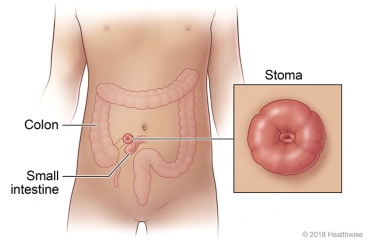Ileostomy: Before Your Child's Surgery
What is an ileostomy?

During an ileostomy (say "ill-ee-AW-stuh-mee"), the doctor attaches
the end of the small intestine to an opening in the skin. This
allows waste to leave the body through a new opening called a stoma.
A pouch attaches to the skin around the stoma. Stools collect in the
pouch. The pouch must be emptied several times each day.
Your child may have this surgery if:
-
Your child's colon was removed because of a disease, such as
inflammatory bowel disease.
-
Your child has a mass in the lower colon that blocks stool from
passing.
-
Your child needs a stoma until their colon can heal from treatment
or surgery.
Your child may feel overwhelmed at first after getting the
ileostomy. But you and your child will soon learn how to take care
of it. Your care team, which may include nurses, a social worker,
and a child psychologist, can help.
Your child will probably need to stay home from school for about 2
to 4 weeks. In time, your child should be able to fully take part in
school, sports, and other activities.
How do you prepare for surgery?
Surgery can be stressful for both your child and you. This
information will help you understand what you can expect. And it
will help you safely prepare for your child's surgery.

Preparing for surgery
|
|
|
|
|
|
|
|
|
|
|
|
|
|
|
|
|
-
Tell the doctor ALL the medicines, vitamins, supplements,
and herbal remedies your child takes. Some may increase
the risk of problems during the surgery. Your doctor will
tell you if your child should stop taking any of them
before the surgery and how soon to do it.
|
The day before surgery
What happens on the day of surgery?
-
Follow the instructions exactly about when your child should stop
eating and drinking. If you don't, your child's surgery may be
canceled. If your doctor told you to have your child take any
medicines on the day of surgery, have your child take them with
only a sip of water.
-
Follow the doctor's instructions about when your child should
bathe or shower before the procedure. Do not apply lotion or
deodorant.
-
Your child may brush their teeth. But tell your child not to
swallow any toothpaste or water.
-
Do not let your child wear contact lenses. Bring your child's
glasses or contact lens case.
-
Be sure your child has something that's a reminder of home. A
special stuffed animal, toy, or blanket may be comforting. For an
older child, it might be a book or music.
At the hospital
-
A parent or legal guardian must accompany your child.
-
Your child will be kept comfortable and safe by the anesthesia
provider. Your child will be asleep during the surgery.
-
The surgery will take a few hours.
-
After surgery, your child will be taken to the recovery room. As
your child wakes up, the recovery staff will monitor your child's
condition. The doctor will talk to you about the surgery.
-
You will probably be able to go with your child to the hospital
room after the surgery.
-
Your child may have a tube in the nose that goes into the stomach
to drain fluid and acid. This is to rest your child's intestines
for a few days.
When should you call your doctor?
Current as of: July 26, 2023
Content Version: 14.0
Care instructions adapted under license by your healthcare
professional. If you have questions about a medical condition or
this instruction, always ask your healthcare professional.
Healthwise, Incorporated disclaims any warranty or liability for
your use of this information.